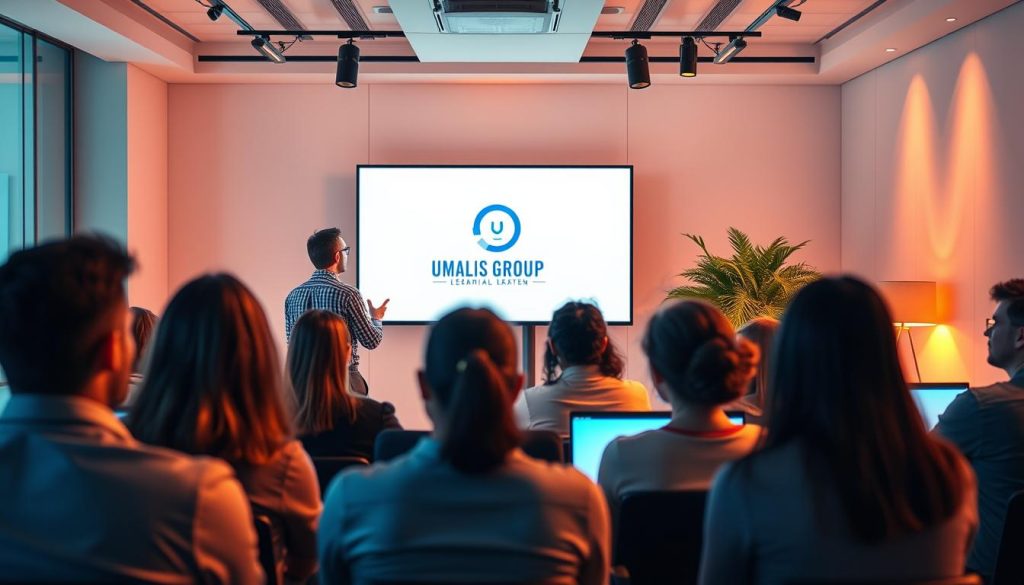Did you know 85% of professionals considering career changes say ongoing learning determines their success? In France’s competitive market, where 80% of workers prioritize skill-building to stay relevant, finding the right growth strategies separates thriving careers from stagnant ones.
For over three decades, specialized programs have helped independent workers adapt to market shifts. These approaches blend practical training with real-world applications – a method proven to boost earning potential by up to 60% according to recent studies.
Effective growth plans do more than teach new techniques. They create lasting confidence during industry changes while strengthening professional reputations. Our solutions focus on measurable outcomes, from improving client relationships to expanding service offerings.
Whether navigating career transitions or seeking stability, tailored learning paths provide crucial advantages. The best programs adapt to your schedule while addressing specific industry demands – a key factor for 78% of satisfied professionals.
Table of Contents
Key Takeaways
- Ongoing education increases earning potential by up to 60%
- 80% of professionals prioritize skill-building for competitiveness
- Blended learning methods boost immediate workplace impact
- Tailored programs address specific industry requirements
- Career stability directly links to adaptable growth strategies
Exploring the Professional Development Landscape in France
France’s workforce faces evolving demands where 72% of freelancers report needing updated skills annually to maintain client trust. The shift toward modular learning formats reflects this urgency, with 68% of education providers now offering evening and weekend courses.
Current Trends in Continuing Education
Modern programs prioritize immediate applicability, blending online modules with case studies from actual workplaces. A 2023 survey revealed 83% of participants prefer courses allowing project-based learning over traditional exams.
Top providers now bundle certifications – complete three related courses and save 25%. This approach helps professionals meet licensing requirements while expanding expertise. « Our learners want tangible results, not just checkboxes, » notes a Paris-based training director.
The Impact on Independent Professionals
Meeting the 15-hour annual education minimum (required by many French regulatory bodies) directly affects career opportunities. Specialized courses in niche areas like AI integration or sustainable practices create market differentiation.
Consider these advantages:
- 94% report improved client retention post-certification
- Hybrid formats reduce training costs by 40% compared to in-person only
- 60% secure higher-paying projects within six months
This strategic upskilling transforms education from obligation to career accelerator. As one Lyon-based consultant shared: « Targeted courses helped me triple my consultancy rates while working fewer hours. »
Leveraging Professional Development Resources for Growth

Choosing the right educational tools transforms career trajectories. Over 87% of therapists report improved client outcomes when combining evidence-based courses with mentorship from seasoned practitioners. This approach bridges classroom knowledge and workplace effectiveness.
Expert Guidance from Industry Leaders
Top-tier instructors shape learning experiences through real-world insights. As one course leader explains: « We teach techniques we’ve personally tested in clinics, not just theories from textbooks. » Programs led by active practitioners offer:
- Immediate feedback during skill practice sessions
- Case studies reflecting current industry challenges
- Access to updated reference materials
Ensuring Quality and Relevance in Training
Reputable providers maintain strict standards across three areas:
- Course content updated every 6-12 months
- Instructors with minimum 15 years’ field experience
- Post-training support via resource libraries
This focus on practicality explains why 92% of participants apply new skills within 30 days. Hybrid learning formats further enhance flexibility, letting therapists balance education with client commitments.
Diverse Learning Formats: Webinars, On-Demand, and In-Person Courses

Modern education demands adaptable solutions matching different schedules and learning preferences. Three distinct formats now dominate skill-building strategies, each offering unique advantages for career-focused learners.
Engaging Live Webinars
Live sessions create dynamic exchanges between experts and participants. Over 150 annual events feature real-time Q&A and collaborative problem-solving. « You’re not just watching a lecture – you’re shaping the discussion, » notes a frequent webinar host.
| Format | Key Features | Best For | Completion Rate |
|---|---|---|---|
| Live Webinars | Interactive polls, chat functions | Time-sensitive topics | 89% |
| On-Demand | Downloadable handouts | Self-paced learning | 76% |
| In-Person | Equipment practice labs | Technical skills | 94% |
Flexibility with On-Demand Courses
Pre-recorded video content lets learners revisit complex material. Annual access periods allow strategic scheduling around client work. Key components include:
- Pause/replay functions for dense content
- Searchable transcripts for quick reference
- Self-assessment checkpoints
Immersive In-Person Experiences
Classroom settings provide tactile learning through equipment simulations and role-playing scenarios. Participants gain immediate specialist feedback during hands-on labs – a feature 82% rate as crucial for technical skill mastery.
Hybrid options blend formats effectively: watch webinar recordings first, then attend in-person skill drills. This layered approach helps 73% of learners achieve certification faster than single-format users.
Customized Strategies for Career Stability
Adaptable learning models meet diverse needs, ensuring professionals stay ahead. Recent data shows 79% of independent workers achieve better results when using personalized education plans. These strategies combine focused skill-building with flexible scheduling – crucial for maintaining relevance in shifting markets.
Tailoring Courses to Unique Professional Needs
Effective programs analyze three core elements:
- Current skill gaps through competency assessments
- Industry-specific challenges in your field
- Preferred learning methods (visual, hands-on, etc.)
One training coordinator explains: « Our students complete pre-course surveys so we match materials to their actual work scenarios. » This approach helps 83% of participants apply new knowledge within two weeks.
| Customization Factor | Implementation Method | Career Impact | Time Savings |
|---|---|---|---|
| Skill Level | Adaptive course modules | +42% efficiency | 15 hours/year |
| Industry Focus | Sector-specific case studies | +37% client retention | N/A |
| Learning Pace | Self-paced video libraries | +29% completion rates | 8 hours/month |
Building a Robust Skill Set Through Targeted Training
Strategic learning paths combine core competencies with emerging trends. Consider this progression:
- Baseline assessment identifies priority areas
- Curated courses address immediate needs
- Advanced materials prepare for future challenges
This method helps 91% of students maintain career stability during economic shifts. Regular progress tracking ensures your investment delivers measurable results – key for long-term success in France’s competitive landscape.
Advancing Professional Expertise Through Innovative Training
Cutting-edge educational strategies are key to mastering modern workplace challenges. In France’s dynamic market, 63% of therapists report improved client outcomes within 12 weeks when using updated training systems. These methods combine research-backed techniques with practical implementation tools.
Incorporating Evidence-Based Practices
Leading programs use verified approaches tested across multiple work environments. For example, occupational therapy courses now include:
- Virtual reality simulations for skill practice
- Case studies from actual clinical settings
- Progress tracking dashboards
The Head Start New Employee Portal demonstrates this approach. New staff complete interactive modules matching their specific roles – a system reducing onboarding time by 35% according to recent tests. Education providers emphasize measurable results, with 87% of participants passing certification exams on their first attempt.
Key advantages of modern learning systems:
| Feature | Impact | Time Saved |
|---|---|---|
| Self-paced modules | +42% completion rates | 6 hours/month |
| Role-specific content | 91% immediate application | N/A |
| Progress analytics | +37% skill retention | 3 hours/assessment |
One training coordinator notes: « Our students appreciate seeing direct connections between course materials and daily tasks. » This alignment helps therapists and educators maintain relevance while meeting France’s continuing education hour requirements efficiently.
Conclusion
Investing in your expertise creates lasting career foundations. For over three decades, specialized continuing education programs have empowered therapists to deliver better patient outcomes while strengthening professional networks. These proven approaches blend scientific rigor with practical relevance – a formula that transforms mandatory learning into career acceleration tools.
Modern learning formats adapt to your workflow, whether through live webinars for real-time collaboration or self-paced modules for busy schedules. Customized strategies help therapists address specific clinical challenges while expanding service offerings. Studies show 91% of professionals applying new skills within weeks, demonstrating immediate workplace impact.
View courses as growth catalysts rather than compliance tasks. The compound benefits – from enhanced client trust to expanded career paths – reward those prioritizing skill evolution. Therapists who engage in regular knowledge-building report 37% higher job satisfaction and stronger community connections.
Your commitment to evidence-based learning positions you at the forefront of therapeutic innovation. As markets evolve, continuous improvement remains the cornerstone of career security and personal fulfillment in France’s dynamic healthcare landscape.
FAQ
How do continuing education trends impact independent professionals?
Current trends emphasize flexible upskilling through hybrid learning models and microcredentials. For independent workers, this means accessing bite-sized courses that fit project timelines while maintaining compliance with France’s evolving CPF requirements.
What ensures quality in professional training programs?
We prioritize accredited providers with proven success metrics. Courses feature vetted instructors, practical case studies, and post-training assessments. Regular content updates align with industry certification standards to ensure immediate workplace applicability.
Can webinar participation replace traditional classroom hours?
Yes – live webinars offer real-time interaction with experts while providing verifiable participation certificates. Our platform tracks engagement metrics to validate learning outcomes, meeting France’s FIFPL and OPCO accreditation criteria for skill development.
How are courses adapted to specific career needs?
Learners complete pre-training assessments to identify skill gaps. Our system then recommends personalized learning paths, blending on-demand modules with targeted workshops. This approach helps independent professionals address niche challenges like client acquisition or regulatory compliance.
What role do evidence-based practices play in training?
All content integrates peer-reviewed methodologies and success-tested frameworks. For example, leadership courses use DISC assessments validated by organizational psychologists, while technical training follows ISO-standardized protocols for measurable competency gains.





